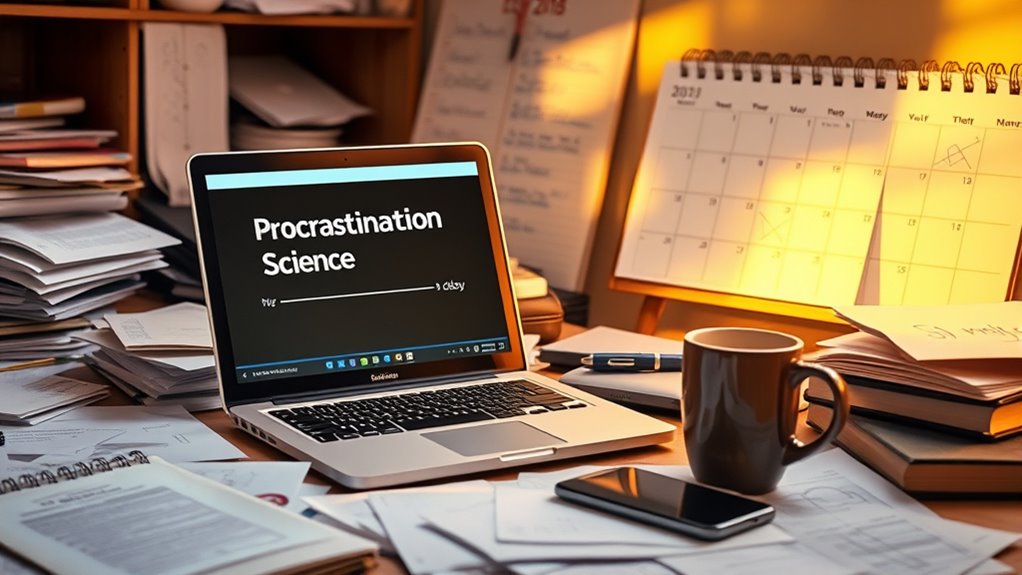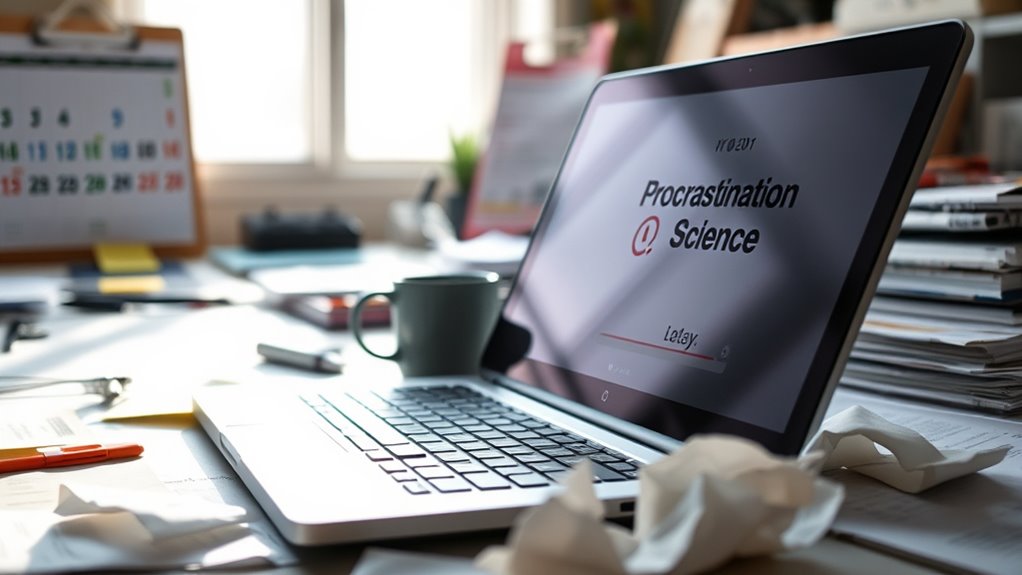Procrastination happens because your brain’s emotional centers, like the limbic system, crave quick rewards, while your prefrontal cortex struggles to manage impulses and plan ahead. Stress, anxiety, and fear of failure amplify delays, making tasks seem overwhelming. Habit formation also reinforces avoidance behaviors over time. Understanding how dopamine rewards delay helps explain why sticking to goals is tough. Continuing this exploration reveals even deeper insights into breaking the “later” habit for good.
Key Takeaways
- Procrastination stems from an imbalance between the brain’s limbic system craving immediate rewards and the prefrontal cortex’s long-term planning.
- Emotional factors like fear of failure and overwhelm activate avoidance behaviors, reinforcing delay habits.
- Dopamine-driven reward pathways reinforce seeking quick gratification, making postponement more appealing.
- Habit formation through repeated avoidance consolidates procrastination into automatic routines, challenging self-control.
- Strategies like breaking tasks into steps and setting deadlines help counteract neural and emotional triggers of delay.
The Psychology Behind Delay: Why We Put Things Off

Have you ever wondered why you keep delaying tasks even when you know they’re important? It’s because your mind is caught between immediate pleasure and long-term goals. When faced with a task, your brain’s limbic system reacts strongly, craving shortcuts and instant gratification. Meanwhile, your prefrontal cortex, which could help you stay focused, often feels overwhelmed or underpowered. This tug-of-war creates a gap where procrastination thrives. You might tell yourself you’ll start later, but that “later” keeps moving further away. Emotions like fear of failure or perfectionism also amplify delay, making the task seem more formidable than it really is. Understanding these psychological triggers helps you recognize why procrastination happens and begins to break its grip. Additionally, engaging in mindful decluttering can help reduce mental clutter, making it easier to focus on tasks without feeling overwhelmed. Recognizing the influence of emotional regulation can also empower you to manage feelings that contribute to procrastination.
The Role of the Brain’s Prefrontal Cortex and Limbic System

Your brain’s prefrontal cortex and limbic system play crucial roles in how you delay or act on tasks. The prefrontal cortex is responsible for planning, decision-making, and impulse control. When it’s active, you’re more likely to resist distractions and prioritize long-term goals. Conversely, the limbic system governs your emotions and immediate desires, often pushing you toward instant gratification. When the limbic system dominates, procrastination can take over, making short-term pleasures seem more appealing than long-term benefits. The balance between these two regions determines whether you act or delay. If your prefrontal cortex struggles to override emotional impulses, procrastination becomes easier. Understanding this interaction helps you recognize why some tasks feel harder to start and how your emotional responses influence your decision to delay. Additionally, high contrast ratios in visual perception can influence your ability to focus, affecting your motivation to complete tasks efficiently. Recognizing the influence of neural pathways involved in decision-making can further aid in developing strategies to reduce procrastination.
Dopamine and the Reward System in Procrastination

Why does completing a tempting task feel so rewarding in the moment? It’s because your brain’s reward system, driven by dopamine, lights up when you do something pleasant or satisfying. Procrastination often involves chasing that quick hit of dopamine, which provides immediate pleasure, even if the task itself is important. When you delay, your brain expects a future reward, but often that reward is less satisfying or delayed. By prioritizing short-term gratification, you reinforce the habit of procrastination. Every time you avoid a stressful task, your brain releases dopamine as a form of relief, reinforcing the behavior. Over time, your reward system becomes conditioned to seek out these quick hits, making it harder to focus on long-term goals that don’t offer instant gratification. Additionally, understanding the horsepower of electric dirt bikes can help illustrate how quick bursts of energy are prioritized over sustained effort, similar to the way the brain seeks immediate dopamine rewards. Recognizing the role of the reward system and the concept of immediate gratification can help you develop strategies to resist these impulses and stay focused on more meaningful, long-term achievements.
How Emotions Influence Our Tendency to Delay

Emotions play a powerful role in our tendency to delay tasks, often overriding logical reasoning and long-term goals. When you feel overwhelmed, anxious, or bored, these emotions can push you toward procrastination as a way to avoid discomfort. For example, fear of failure might make you delay starting a project, while frustration or boredom can lead you to seek immediate relief through distraction. Sometimes, positive emotions like excitement or anticipation cause you to postpone work because you want to savor the moment or extend the fun. Your emotional state acts as a filter, influencing how you perceive tasks and whether you’re motivated to tackle them now or put them off. Recognizing these emotional triggers helps you understand why delay feels so appealing. Additionally, comfortable and supportive environments can help reduce stress and create a more conducive environment for addressing tasks. For instance, choosing a dog name that reflects a calm and confident personality might inspire a more focused mindset. Understanding paint sprayer technology can also shed light on how tools influence efficiency and motivation, making work feel less daunting.
The Impact of Stress and Anxiety on Task Avoidance

When stress and anxiety build up, you’re more likely to avoid tasks to escape feeling overwhelmed. These emotions intensify your tendency to delay, making focus even harder. Emotional overload can quickly derail your progress, leading to more procrastination. Recognizing the emotional impact of stress can help you develop better coping strategies to stay on track. Additionally, understanding how the Law of Attraction influences your mindset can empower you to shift your energy toward positive outcomes, reducing feelings of being overwhelmed. Incorporating mindfulness practices can further help in managing emotional responses and maintaining clarity during stressful times. Cultivating healthy communication skills can also create a supportive environment that reduces emotional strain and fosters resilience.
Stress Amplifies Avoidance Tendencies
Stress and anxiety can substantially increase your tendency to avoid challenging tasks. When you feel overwhelmed, your brain perceives the task as more threatening, leading you to delay or sideline it. This avoidance provides temporary relief but often worsens your stress later. Recognizing this cycle helps you understand why stress fuels procrastination. For example, high stress levels can impair decision-making and motivation, making it even harder to tackle tasks. Additionally, understanding Prophetic Dreams can help you gain insight into subconscious fears that may contribute to avoidance behaviors, which in turn can lower stress related to car maintenance or upgrades.
Anxiety Fuels Task Delay
Anxiety intensifies task avoidance by making challenges seem more intimidating and overwhelming. When you feel anxious about a task, your mind focuses on worst-case scenarios, increasing fear and hesitation. This emotional response convinces you that delaying is safer than facing potential failure or criticism. You might also notice:
- Increased self-doubt, fueling procrastination
- A desire to avoid perceived judgment or mistakes
- Physical symptoms like sweating or racing heartbeat that distract from work
- A tendency to seek distractions as a way to escape anxiety
These reactions create a cycle where anxiety feeds into delay, making tasks appear more formidable than they really are. Recognizing this pattern helps you understand why stress can keep you stuck in a procrastination loop.
Emotional Overload Hampers Focus
An emotional overload caused by stress and anxiety can profoundly impair your ability to concentrate on tasks. When you’re overwhelmed, your mind races with worries, making it hard to focus on what’s in front of you. Instead of tackling your work, you might find yourself avoiding it or drifting into distraction. This emotional chaos drains your mental energy, reducing your capacity to stay engaged. You may feel paralyzed by fear of failure or overwhelmed by deadlines, which only increases avoidance. As stress builds, your brain shifts into survival mode, prioritizing immediate relief over productive effort. Recognizing this pattern helps you understand why emotional overload hampers focus and drives procrastination. Managing your stress becomes essential to regain clarity and stay on task. Additionally, understanding Jeep Tuning concepts can demonstrate how fine-tuning your mental approach is similar to optimizing vehicle performance, helping you better navigate stress and improve focus. For example, incorporating relaxation techniques or structured routines can act as stress management strategies to enhance your mental resilience and focus, especially since many Lifestyle habits can influence emotional wellbeing.
Habit Formation and the Reinforcement of Procrastination

Habit formation plays a crucial role in reinforcing procrastination because repeated avoidance behaviors become automatic over time. When you put off tasks repeatedly, your brain starts associating procrastination with relief, making it easier to delay again. This cycle strengthens your habit, making it harder to break. You may notice that:
- Small delays become larger avoidance routines
- Your brain seeks comfort in familiar procrastination triggers
- Negative feelings about tasks reinforce the habit
- Procrastination becomes a default response to stress or boredom
- Understanding appliance maintenance plans can help reduce stress by ensuring your routines stay on track and prevent last-minute rushes.
- Research in sound healing science suggests that altering brainwave patterns through specific frequencies could assist in overcoming ingrained habits.
- The security of a home security system can provide peace of mind, reducing stress and the impulse to delay addressing home safety concerns.
- Implementing digital resources like project management tools can help organize tasks and reduce the likelihood of procrastination.
Over time, these patterns cement into habits, and breaking free requires conscious effort. Recognizing how habits form helps you understand why procrastination persists, making it easier to develop strategies to rewire your responses and create healthier routines.
The Science of Willpower and Self-Control

Your ability to resist temptation depends on specific brain regions working together. Understanding how these areas function can help you develop strategies to boost your self-control. By strengthening these neural pathways, you can better manage your impulses and reduce procrastination. Techniques like mindfulness and goal setting can activate these regions, enhancing your self-control capabilities. Additionally, recognizing the role of neural pathways in impulse regulation can inform more targeted approaches to improving willpower. Incorporating knowledge of essential oils and their calming or stimulating effects may also indirectly support self-control by influencing emotional states and stress levels.
Brain Regions Involved
Understanding how your brain manages willpower and self-control involves exploring specific regions responsible for these functions. The prefrontal cortex plays a key role, acting as your decision-making center and helping you resist temptations. The anterior cingulate cortex monitors conflicts between impulses and goals, signaling when you need extra control. The amygdala processes emotions like fear and pleasure, which can influence your ability to stay disciplined. Lastly, the insula is involved in awareness of bodily states, affecting your emotional responses and motivation. These regions work together to help you prioritize long-term goals over immediate rewards. When procrastination takes over, it’s often because these areas aren’t communicating effectively, making self-control more difficult. Strengthening these regions can ultimately improve your ability to resist the “later” habit. Additionally, engaging in activities that enhance self-control can promote better communication among these brain regions, reducing the tendency to delay tasks. Regular practice of mindfulness and decision-making exercises can also support the development of these critical areas, leading to improved self-regulation and productivity. Developing a strong understanding of brain region functions can further aid in crafting effective strategies to combat procrastination.
Strategies to Strengthen
Strengthening the brain regions involved in self-control is essential for reducing procrastination and boosting willpower. You can do this by practicing mindfulness meditation, which enhances prefrontal cortex activity and improves your ability to resist temptations. Regular exercise also supports self-control by increasing blood flow to key brain areas and reducing stress. Setting clear, specific goals helps your brain focus and prioritize tasks, making it easier to stay disciplined. Breaking large tasks into smaller, manageable steps prevents overwhelm and keeps your willpower intact. Additionally, establishing routines reduces decision fatigue, conserving mental energy for self-control. Finally, practicing self-compassion when setbacks occur helps you bounce back faster, strengthening your resolve over time. With consistent effort, you can train your brain to become more resilient against procrastination.
Technological Distractions and Their Effect on Productivity

Technological distractions have become one of the most significant barriers to maintaining focus and productivity in today’s digital age. Constant notifications, social media, and instant messaging pull your attention away from tasks, making it harder to stay on track. These interruptions break your concentration, increase frustration, and extend the time needed to complete work. You might find yourself checking your phone repeatedly, losing valuable momentum. To combat this, consider:
- Turning off non-essential notifications
- Using apps to block distracting sites
- Setting specific times for social media
- Creating a clutter-free digital workspace
Strategies Backed by Research to Overcome Procrastination

Research shows that specific strategies can considerably reduce procrastination and boost your productivity. One effective approach is breaking tasks into smaller, manageable steps, making them less overwhelming. Setting clear deadlines creates a sense of urgency, encouraging you to start promptly. Additionally, eliminating distractions and using techniques like the Pomodoro Method—working in focused intervals—can improve focus and efficiency.
| Strategy | Benefits |
|---|---|
| Break tasks into steps | Reduces overwhelm |
| Set specific deadlines | Increases motivation |
| Use focused work intervals | Enhances concentration |
Implementing these research-backed strategies helps you take immediate action, stay on track, and build momentum toward completing tasks efficiently.
Frequently Asked Questions
Can Procrastination Be Entirely Eliminated or Just Managed?
You might wonder if you can completely eliminate procrastination or just manage it. While some strategies can reduce your tendency to delay tasks, it’s unlikely you’ll eradicate it completely, since a little procrastination is natural. Instead, focus on managing it effectively, setting realistic goals, and creating routines that keep you on track. By understanding your habits, you can control procrastination and improve your productivity over time.
How Does Procrastination Differ Across Various Personality Types?
Imagine you’re in a medieval tavern debating whether different personalities procrastinate differently. You notice that impulsive types tend to delay tasks more often, seeking instant gratification, while perfectionists stall out of fear of imperfection. You realize your traits influence your procrastination style. Recognizing these differences helps you tailor strategies—like time management or self-compassion—that suit your personality, making it easier to overcome delays and boost productivity.
Are There Genetic Factors Influencing Procrastination Tendencies?
You might wonder if genetics play a role in procrastination. Research suggests that certain genetic factors can influence traits like impulsivity and self-control, which affect how you delay tasks. While genes aren’t the sole cause, they can predispose you to procrastinate more or less. Your environment and habits also matter, but understanding your genetic makeup can help you develop targeted strategies to overcome procrastination tendencies.
How Do Cultural Differences Impact Procrastination Behaviors?
Cultural differences shape how you handle tasks and deadlines, making procrastination seem like a minor hiccup or a major obstacle. In some cultures, punctuality and immediate action are prized, pushing you to stay on top of things. In others, a more relaxed attitude toward time encourages delaying tasks without guilt. These cultural norms influence your habits, making procrastination either a rare event or a common occurrence, depending on where you’re from.
What Are the Long-Term Mental Health Effects of Chronic Procrastination?
Chronic procrastination can seriously harm your mental health over time. It may lead to increased stress, anxiety, and feelings of guilt or failure. You might struggle with low self-esteem and find it harder to stay motivated, which creates a vicious cycle of avoidance. If you keep delaying important tasks, you could face long-term emotional exhaustion, burnout, and even depression, making it harder to enjoy daily life and achieve your goals.
Conclusion
Understanding why you procrastinate is like opening a hidden door in your mind. By knowing how your brain’s reward system, emotions, and habits fuel delay, you can take control. Think of willpower as a muscle—you can strengthen it with practice. So, don’t let distractions be the thief of your time. With research-backed strategies, you can break free from procrastination’s grip and turn your “later” into “now.”









